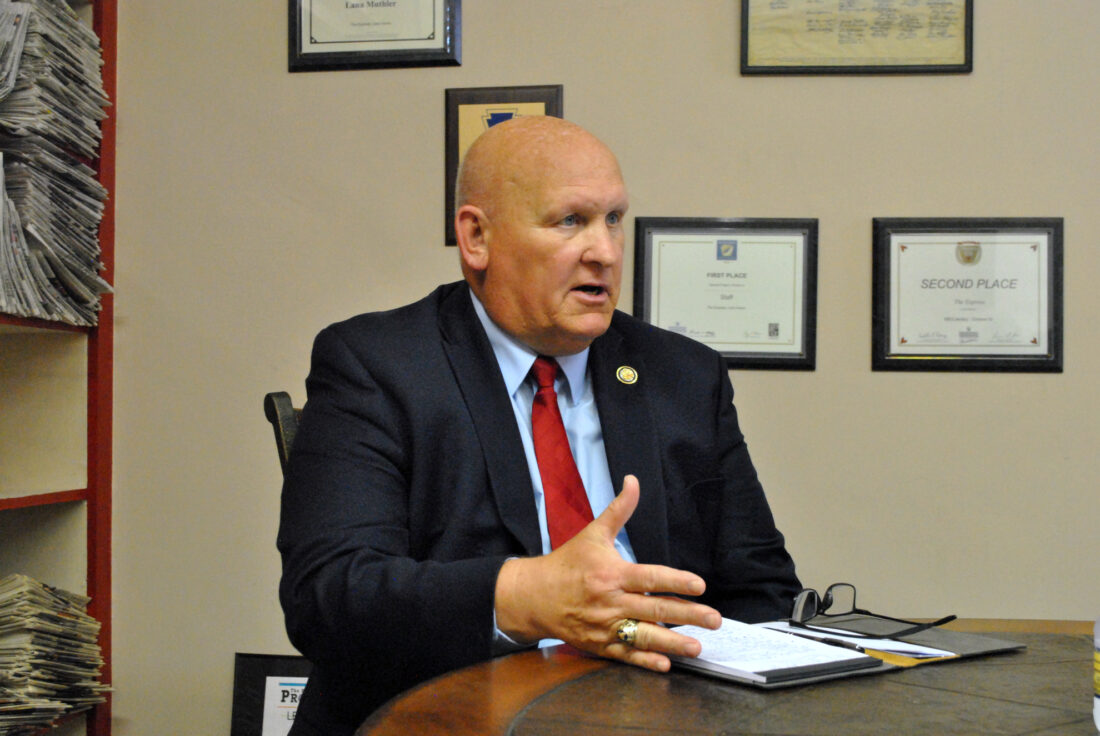Thompson talks ‘Big Beautiful Bill,’ education, agriculture and more

HUNTER SMITH/THE EXPRESS U.S. Representative Glenn “GT” Thompson speaks about the positive impacts he feels the recently enacted “Big Beautiful Bill” will have on residents within the 15th District, which includes Clinton and Centre counties.
LOCK HAVEN — With 18 counties within the 15th Congressional District, U.S. Representative Glenn “GT” Thompson represents a 1/3 of the landmass of Pennsylvania on the federal level.
Thompson recently stopped at The Express to discuss what actions he’s taken in Washington, D.C.; his thoughts on the “Big Beautiful Bill” and its impact on the local area; education; rural healthcare and more:
‘BIG BEAUTIFUL BILL’
The recently enacted federal budget, HR1 — otherwise known as the “Big Beautiful Bill” — has brought mixed reactions.
For Thompson, he looks at it favorably.
“I think most of it is pretty good, if you really look at what was actually in it and not just the rumors that have been spread,” he said.
Thompson told The Express there were two titles within the federal budget he was most excited for — agriculture and taxes.
Thompson said the agriculture title is his favorite part of the bill.
“As the chair of the House Agriculture Committee, the agriculture title has to be my favorite,” he said.
He explained the Farm Bill — which was set to expire in September — is typically only five years. However, with the passage of HR1, the bill was extended to six years.
The provisions laid out in HR1 helped pass about 80 percent of the Farm Bill, he said, and it offers a variety of assistance to farmers. This included:
— A $70 billion investment in risk management.
— Modernizing the dairy margin coverage. “Which is our largest commodity in Pennsylvania,” he said.
— New investments in research in American Agriculture. “My definition of this is science, technology and innovation. So that’s really important. We want to stay ahead of China and other countries that are trying to catch us in terms of animal health, etc.,” he said.
There were also investments in the Conservation Title which benefits farmers.
“It helps our farmers… protects our watersheds,” he said.
The bill also featured updates to crop insurance.
“We’ve made it more versatile to help with disaster situations (and) made it more affordable for everybody,” he said.
Thompson explained he’s been referring to this as Farm Bill 3.0.
“It really is huge… based on provisions we took out of the Farm Bill that we marked up in committee last congress — the Farm, Food and National Security Act — in 2024,” he said. “We couldn’t do everything but we did most things.”
Thompson said there’s a “sliver” left but noted “it’s fairly affordable and should be bipartisan.”
This remaining portion involves rural economic development, broadband access and other policies.
“We’re working on that right now,” he said.
Another portion of the “Big Beautiful Bill” Thompson favors is its Tax Title.
He said the bill helps a typical family of four avoid a $1,700 tax increase in the fall.
“That’s basically what you spend on groceries in a month,” he said. “And on top of that, with the additional tax cuts we did… we’ll probably be affecting families around $10,000 in a real positive way. That’s more money that they’ll keep.”
This title, Thompson said, also delivered on certain promises made by Trump in the past. This includes no tax on tips up to $25,000; no tax on overtime for the first $12,500 for an individual and $25,000 for those who file jointly.
“That’s a pretty big deal,” he said.
Other portions of the title Thompson favored were the ability to deduct up to $10,000 of interest off the purchase of a United States made car; those 65 and older being able to deduct $6,000 “right off the top”; the elimination of the death tax and updates to the child tax credit.
“It went from $2,000 per child to $2,500 per child and we made that permanent going forward,” he said of the tax credit. “I think economically in terms of impact on people’s lives, everything within that part of the bill has a really big impact on the working class individuals and families.”
EDUCATION
Education, particularly career and technical education and offering school choice, are key factors in Thompson’s decision making while on Capitol Hill.
With the passage of the “Big Beautiful Bill” Thompson said — as a senior member of the Education Workforce Committee — it featured positive developments for education. This includes the creation of short-term Pell grants.
“Short term Pell is now in law. That’s something I always pushed for,” he said.
This form of federal financial aid, he said, was typically offered to individuals who were seeking a four-year degree in higher education.
“Now you can do short-term Pell… which means certification programs, career and technical education, summer Pell — if you want to go to school year-round and get out of school early to start saving and avoid school debt,” he said.
The federal budget also featured a new tax credit program which leans into school choice.
“If you’re an organization that provides scholarships and a donor donates to you, then that donor receives a tax credit,” he said. “That money can be donated to parents that are looking to send their child to a private school or a school of their choice. That’s kind of a first.”
Thompson said he is a huge support of public education but said it’s important parents have a say in their child’s education.
“I have confidence in public education. I think we can compete if we get out of their way,” he said. “But at the same time, I do believe parents need to be the decision makers in terms of the education of their child.”
Career and technical education is another pillar of Thompson’s work.
“I’m the leader in career and technical education in the nation,” he said.
In 2018, a bill authored by Thompson was signed into law and “resulted in waiting lists in our schools and great paying jobs.”
“But I’m not sitting back, there’s a lot of work I’m doing in that space to continue to improve opportunities for career and technical education,” he said.
Most recently, the Whole Milk for Healthy Kids Act passed out of the Education Workforce Committee and will be taken under consideration. Thompson was the author of this act.
“We’re expecting success here at the end of the year,” he said. “That’ll be huge for kids to have access to the most nutritious beverage out there.”
He noted the bill, which will give kids access to whole milk in school, will be beneficial to dairy farmers.
“It’s important for dairy farmers in rural America too,” he said.
In higher education, Thompson said he is encouraging universities to reimagine education to help boost enrollment.
He noted he spoke out against the merging of Lock Haven, Mansfield and Bloomsburg campuses into Commonwealth University, its subsequent closure of its Clearfield campus and the closure of Penn State University’s Dubois campus.
“My encouragement to all these schools is to reimagine education… from a workforce perspective,” he said. “Maybe we don’t need as much resources in 3 year, 5 year and 6 year degrees.”
He noted enrollment in many universities continues to see a decline and said, these degrees are important, but other avenues of education can be as well.
“Our schools, be it Lock Haven, Clarion or Penn State, should look at what the workforce needs are in the community,” he said.
The continued updates in technology also are a factor.
“Somebody that’s working a job for maybe a decade can see the job change because now they’ve mechanised or brought in computers or robots. You still need lots of warm bodies that are skilled to be able to maintain all that,” he said. “But those are new skill sets.”
“I’ve encouraged our schools to look at that. What are the skill sets that they could be helping instill into the current workforce,” he concluded.
ECONOMIC GROWTH
With many businesses struggling financially, and some even shutting their doors, Thompson believes portions of the “Big Beautiful Bill” will help encourage investment in commercial industries and small businesses.
One portion of the bill includes renewing the Opportunity Zone.
“That provides tax credits encouraging people to invest in, quite frankly, areas like ours which have been struggling compared to more urban or suburban areas,” he said.
The tax provisions laid out in the bill, he believes, will also help with job growth in the region.
“You can’t create a business without qualified and trained workers. So all the work I do in career and technical education, all the work within the ‘Big Beautiful Bill’… really incentivizes people to work and provides additional support for employment and career and technical education,” he said.
Thompson emphasized for businesses to succeed, there needs to be a workforce.
“It’s really important because we need a workforce,” he said. “We can talk about wanting to create jobs, but we really need a pipeline of folks to go there.”
IMMIGRATION
After being quoted telling the Trump Administration to “knock it off” when it came to raids of farms by Immigrations and Customs Enforcements (ICE), Thompson said there’s a dialogue taking place.
In June, Thompson expressed frustration with these raids and the potential for disruptions in the food supply chain. He’s currently working on ways to ensure that doesn’t happen.
“One of my goals is reforming our work visa system to be able to have the workers we need,” he said.
Thompson noted filling these roles begins with domestic workers, but it can’t stop there.
“We also need to encourage people to come here in legal ways to be able to fill our workforce,” he said. “Specifically my work has been largely focused on agriculture.”
Thompson said his call to the Trump Administration is one he felt was important.
He acknowledged some of the individuals who are filling these jobs in the agriculture space often have temporary status, but it’s important to have a system in place that doesn’t disrupt the industry.
“If we have these people leave now, before we have processes in place to have the workforce we need, we’re facing food insecurity, rural economic insecurity and national insecurity,” he said.
During a press conference outside of the United States Department of Agriculture’s office in Washington, D.C. this week, Thompson said he emphasized the unreliability of the workforce in the agriculture industry.
“Our farmers are the frontline of defense for food security and, in turn, national security,” he said.
Thompson said he’s working on a bill that could help combat this issue — based on findings compiled through a subcommittee and task force.
“I chose to do a task force on workforce certainty for farmers. I put eight Republicans and eight Democrats on to make it even,” he said.
He also had Republican Rick Crawford, of Arkansas, and Democrat Don Davis, of North Carolina, serve as co-chairs.
“They had both agriculture producers and processors come in and testify and put together recommendations at the end of the day,” he said. “We’re using those recommendations to write legislation.”
Thompson said he appreciates the communication with the Trump Administration to find solutions to these issues.
“I don’t know if telling them to knock it off was the most appropriate way to communicate. But it got to President Trump,” he said.
This, he said, was reinforced during the press conference this week when USDA Secretary Brooke Rollins acknowledged that — while there is no amnesty for individuals who are in the country illegally, there are still steps that should be taken to avoid disruptions in the agriculture industry.
“We need to make sure we are careful in the turnover of our workforce in agriculture. Because a disruption would lead to higher prices, food insecurity,” Thompson said. “I’m pleased with the communications that were initiated and how welcoming they are to something that might appear as criticism. It’s made a difference in the policy world.”
RURAL HEALTHCARE
In recent years rural healthcare, particularly in Clinton County, has taken intense hits. From the conversion of UPMC Lock Haven Hospital into an emergency department and continued financial struggles at Bucktail Medical Center — which is the only hospital in the county — the future of medical care for those in the region can be uncertain.
Thompson said he continues to be a champion for Bucktail Medical Center.
“Bucktail is a pretty special place. Western Clinton County is pretty isolated (and) the hospital is a really important part of that economy,” he said.
He told The Express he’s been working with the hospital for over a decade to help keep them operational.
“I try to encourage them to look at partnering with (Veterans Affairs), looking at different programs and specialties that they can offer,” he said.
He said he’s pleased with the work being done so far.
“It seems like they’re moving in the right direction,” he said.
A loss of Bucktail Medical Center would be a huge hit.
“It would be awful to lose that facility… it’s jobs, it’s economic impact and it is also a lifesaving component,” he said.
Without Bucktail Medical Center, Thompson said western Clinton County residents would be up for an almost hour long commute to an emergency department in Lock Haven, and likely transported to another facility even farther away.
“The UPMC move with Lock Haven has really compounded the Bucktail issue,” he said, noting the transition to an emergency department has caused an increased need for EMTs and other personnel that can be lacking. “Growing up in this area I never thought I’d see the day where Bucktail Medical Center was the only functioning hospital in Clinton County.”
Thompson believes aspects of the “Big Beautiful Bill” — particularly regarding Medicaid — will hopefully help strengthen rural healthcare.
He explained that the bill outlines that anyone who is between the ages of 18 and 64 and able-bodied, without dependent children or a parent or child with a disability, will have three options to retain Medicaid while working towards employment.
He said the bill formats Medicaid requirements similar to SNAP. After three months, these individuals will either need to find employment — and in-turn employer provided healthcare; if they can’t find a job they can also do community service for up to 80 hours a month; or they can engage in an average of 80 hours per month of employment or career and technical education.
“If we can get more people in the workforce, where people tend to have their insurance, that will be a benefit,” he said.
According to Thompson, Medicaid pays an average range of 40 to 60 cents on the dollar of cost for a hospital.
So hospitals lose money every time they treat somebody on Medicaid,” he said.
The average coverage per $1 for an employer-based insurance, he said, is between $1.30 and $1.50.
“That’s actually strengthening the bottom line for rural hospitals,” he said.
The bill also allocated a $50 billion fund for rural hospitals that will be distributed amongst the states, he said.
ANECDOTE
Before concluding his interview, Thompson shared a humorous anecdote he often tells others about his time in Congress involving US Rep. Mike Kelly — who Thompson mentored when he was first elected to the House.
Thompson said, years ago during redistricting, he and Kelly shared portions of Erie County. He explained residents in the area were not happy with the split.
“It didn’t make sense to me because, when two people cover a county, you have separate areas but you still represent the whole county,” he said.
Thompson said that, while being interviewed about the split, Kelly commented “these folks should be happy because they now have 600 pounds of congressmen.”
Thompson said when his wife, Penny, saw this interview she found it a bit interesting.
“My wife saw that and thought ‘wow, I don’t know how big Mike is but I know how big you are,'” he recalled. “So I have harassed him ever since about that comment.”




